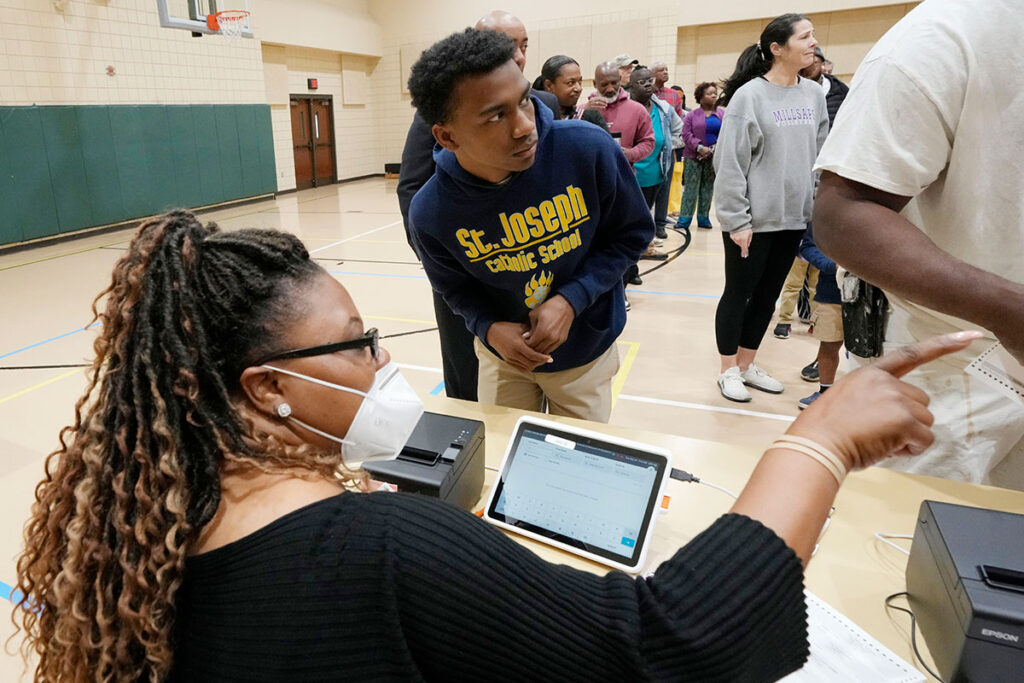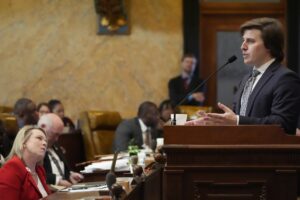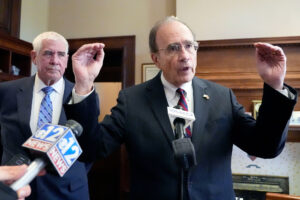Hinds County’s failure to ensure voters had enough ballots to vote in Mississippi’s Nov. 7 general election is drawing scrutiny from Congress. On Dec. 5, U.S. House Committee on House Administration Chairman Bryan Steil, a Wisconsin Republican, sent a letter to all five members of the Hinds County Election Commission demanding answers.
The congressman noted that his committee “has broad oversight of our nation’s federal elections” and said he wanted to express his “deep concerns about reports that several polling locations in Hinds County, Mississippi, ran out of ballots on Election Day.”
“Situations like this reported ballot shortage and the distribution of incorrect ballot styles have the potential to damage voter confidence at a time when we can least afford it,” Steil wrote. “As you may know, the Committee is especially concerned with resolving any issues that may lead to the disenfranchisement of voters due to government-created ballot shortages.”
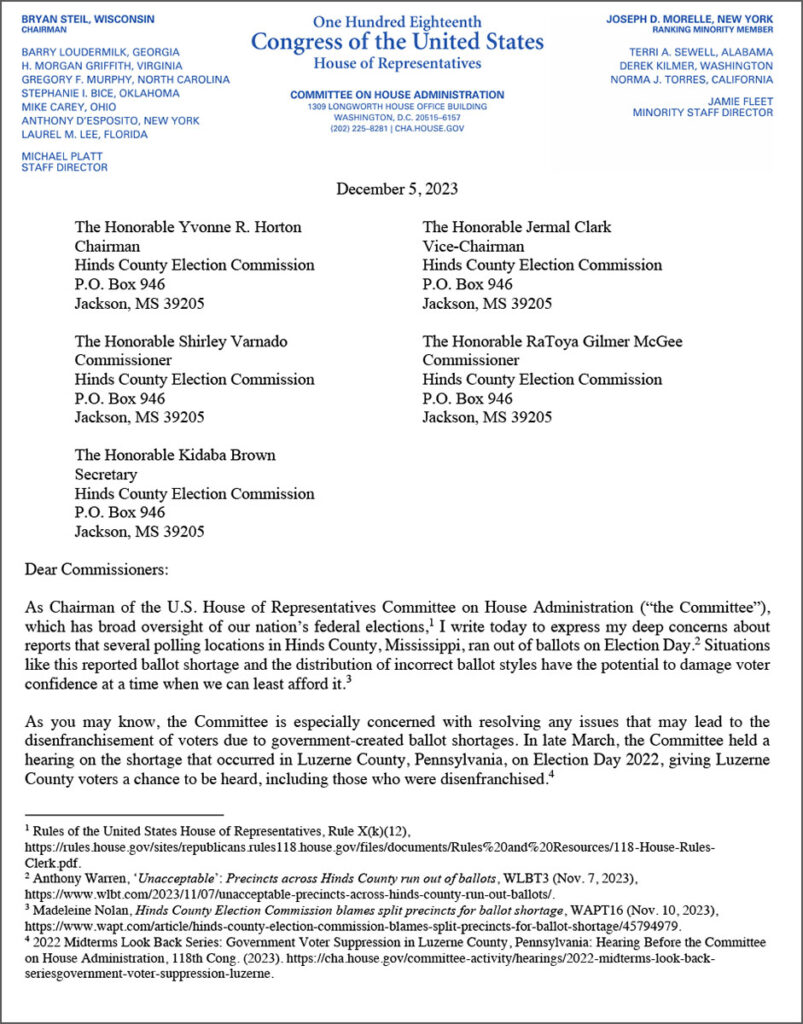
In Mississippi, county election officials are in charge of ensuring voters in each of their precincts have enough ballots. But on Election Day, voters in at least nine Hinds County precincts were unable to cast a ballot due to shortages. In some cases, people waited hours for election officials to print more ballots; some precincts repeatedly ran out of ballots; other precincts received incorrect ballots.
“Although a court order allowed polls to remain open to give voters additional time to vote, some voters may still not have been able to vote. This is completely unacceptable and does not inspire Americans’ confidence in our nation’s elections,” Steil’s letter says.
Last month, WJTV reported that the Hinds County Election Commission attributed the shortages to officials using the wrong forms for ballot orders and that “the commission said they take full responsibility for what occurred during the general election.” Election Commissioner Shirley Varnado, who represents District 5, said she hoped the Mississippi secretary of state’s office would offer assistance or guidance in the future.
After the election, Mississippi Secretary of State Michael Watson’s office placed the blame squarely on Hinds County election officials. His office trains local election officials, oversees elections and certifies election results, but it does not directly manage elections; those tasks are left up to local election officials.
“The Hinds Co. Election Commission had the same access to the training and materials received by the other 81 counties,” he wrote in a Nov. 11 tweet. “The HCEC has owned their mistake. They didn’t prepare the proper number of ballots for each ballot style needed. We’ll meet with them soon to get the details.” Watson has similarly pointed to local election officials in response to the Mississippi Free Press’ reporting on widespread issues with the statewide election system including erroneous voting precinct information in dozens of counties.
Later, in a newsletter on Nov. 30, the secretary of state declared the 2023 elections a success.
“We are pleased to report a successful General and Runoff Election Day in 81 of 82 Mississippi counties. … I’m extremely proud of the hard work done by Mississippi’s election team consisting of circuit clerks, election commissioners, poll workers across the state, and our team here at the secretary of state’s office,” Watson wrote. “Mississippi had a phenomenal election season due to their hard work, and the credit belongs to them. Outside of the issues in one county, Mississippians should be proud of the success of November’s election.”
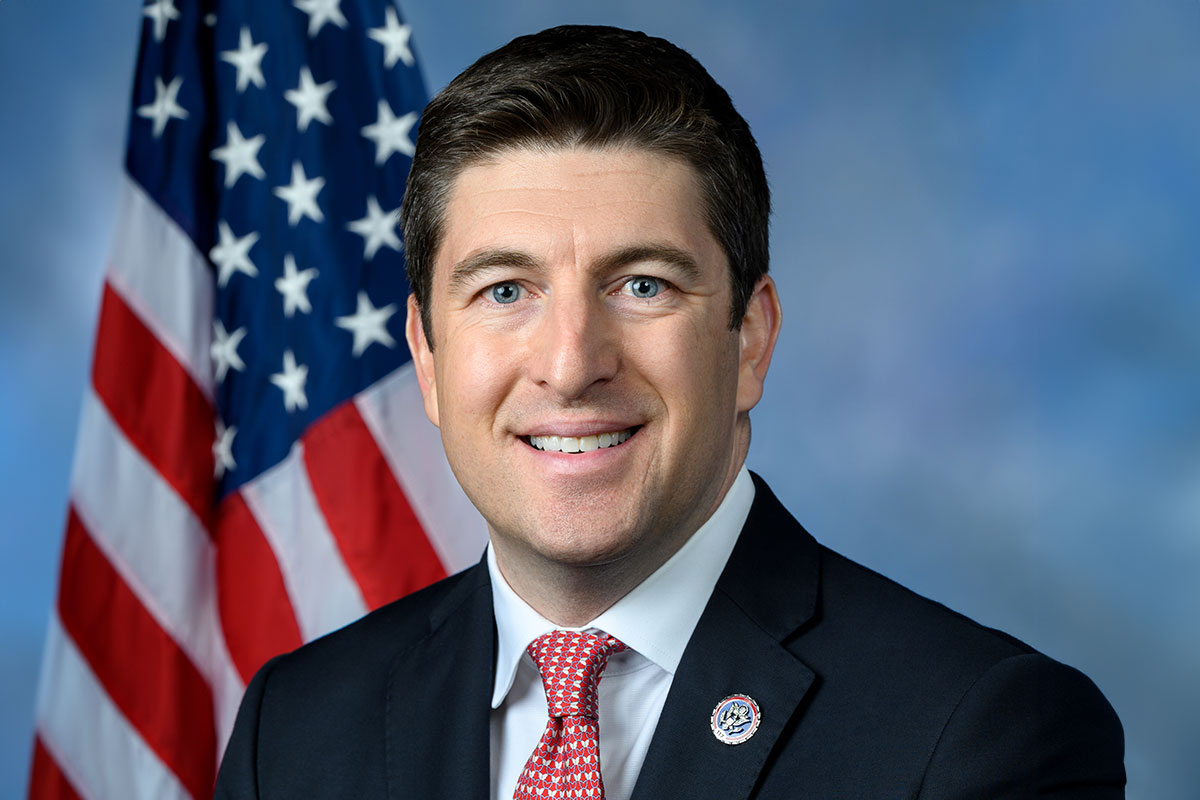
Though Steil’s letter is not directly addressed to Watson, he is cc’d on it. The letter notes that under Mississippi law, “the chair of each county election commission is given the duty and responsibility to print all ballots necessary for the election” and “the chair is charged with ascertaining from the registrar at least 10 days before the election the number of voters registered in each precinct.”
“These serious issues of ballot shortages and incorrect ballot distribution appear to have occurred in spite of these strong requirements in Mississippi law, and I am concerned that these recent events may repeat themselves in the upcoming federal election,” he wrote.
The letter asks the Hinds County Election Commissioners to “identify what steps” they have taken to “(i) learn from this ballot shortage and ensure no precinct in Hinds County, Mississippi, has a shortage in any upcoming federal election and every precinct receives the correct ballot style(s); (ii) prepare for the 2024 federal primary and general elections in Hinds County, Mississippi; and (iii) restore confidence and to ensure voters that the correct ballot will be available when they next attempt to vote in person.”
The chairman’s letter asks the commission to submit responses by Dec. 19.
Mississippi has had problems with ballot shortages before. In the August 2023 primaries, a precinct in Madison County ran out of Republican ballots while a precinct in Leflore County ran out of Democratic ballots, WAPT reported.
Hinds County also suffered from ballot shortages during the 2014 midterm elections, with one apologetic election official saying they did not print enough ballots that year to save money.
No Hinds County election commissioners who had read the letter were available to comment at press time.


